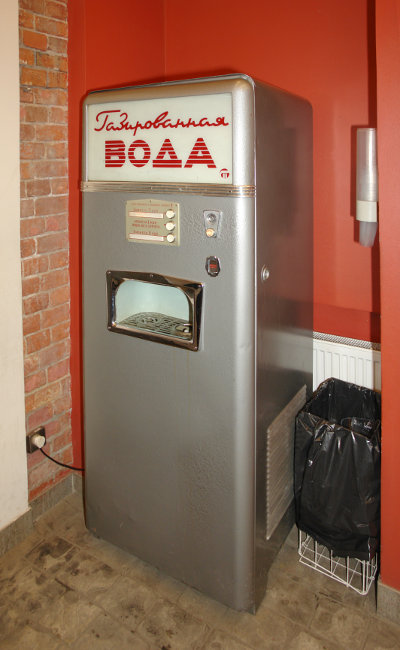Category: "Beverages"
Сок (часть первая)
The word for juice is сок. Usually when we talk about juice, we specify the type of juice, thus we have phrases like:
orange juice
grape juice
In English the phrase “apple juice” is made up of two nouns where the first noun modifies the second noun. In Russian you don't normally use a first noun to modify a second noun. Instead you change the first noun into an adjective and then use it with the second word, thus:
| Noun | Adjective | Phrase | Meaning |
| яблоко | яблочный | яблочный сок | apple juice |
| апельсин | апельсиновый | апельсиновый сок | orange juice |
| виноград | виноградный | виноградный сок | grape juice |
Here are some sample sentences:
| — Какой сок ты хочешь? — Яблочный. |
“What kind of juice do you want?” “Apple juice.” |
| Боря очень любит апельсиновый сок. | Boris really likes orange juice. |
| Я думал, что это яблочный сок, но оказывается, что это виноградный сок. | I thought that this was apple juice, but it turns out that it is grape juice. |
| Купи мне гранатовый сок, пожалуйста. | Buy me pomegranate juice, please. |
Many liquids sometimes appear in the genitive case to indicate ‘a quantity of,’ and juice is one of them. We call that usage the partitive genitive. Note the contrast in these sentences:
| Он выпил сок. (accusative) | He drank the juice. |
| Он выпил сока. (genitive) | He drank some juice. |
Сок is interesting because it has an alternative partitive genitive case form соку in addition to the regular genitive; sometimes we call those forms ‘second genitives.’ Thus you might come across:
| Он выпил соку. (second genitive) | He drank some juice. |
Those second genitives are becoming less and less common. They are more conversational in style, less formal. You are very likely to hear them out of the mouth of someone's grandmother. A younger person with a big-city education will use them less often.
Чай (часть вторая)
The Russian word for tea is чай. Russians drink a lot of hot tea, even when it's hot out. They seem to have this theory that if you drink hot tea, then you sweat, and sweat cools you down, so drinking hot tea cools you down. Don't try to argue with the logic of that. They won't buy it.
In the States if you ask someone under 30 how to make tea, they will probably tell you something like: "Put the teabag (чайный пакетик) in the cup (чашка). Pour in boiling water (кипяток). When the water changes color, pull the teabag out." If they are tea experts, they might add, "Pull out the teabag as soon as the water changes color or the tea will turn out bitter." A Russian would just laugh at that. Yes, Russians have teabags, but making tea with them is a sign of incompetence. That's right: tea-bagging = incompetence.
So how do Russians make tea? Obviously you have to start with a чайник teapot:
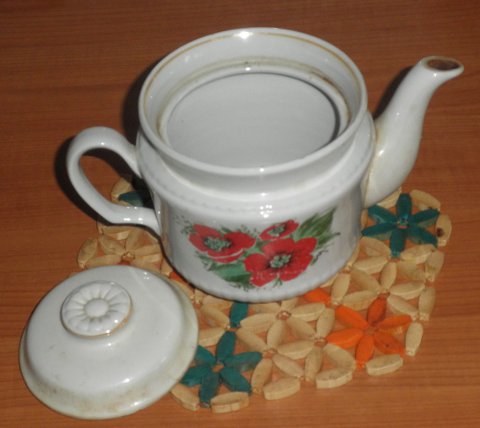
You may notice that the teapot is not the same thing as an American tea kettle. The teapot is smaller. If you rotate it, then you see that it has a built-in strainer:
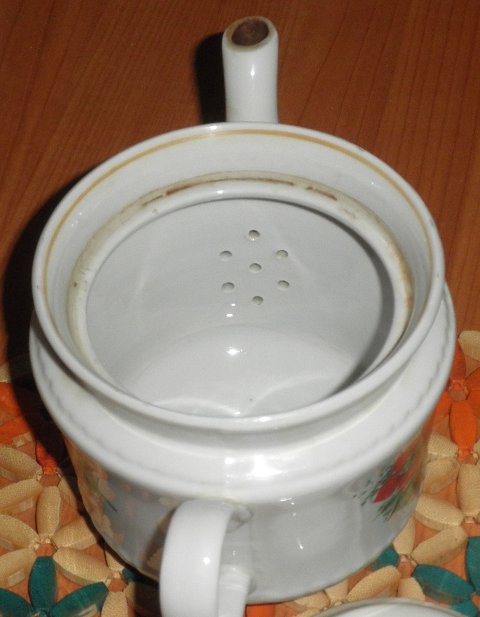
Here's how it works. You put a ton of tea in the teapot, then you add hot water. This makes a заварка, which is an intense tea brew. You then fill your cup perhaps one fourth full of the заварка:
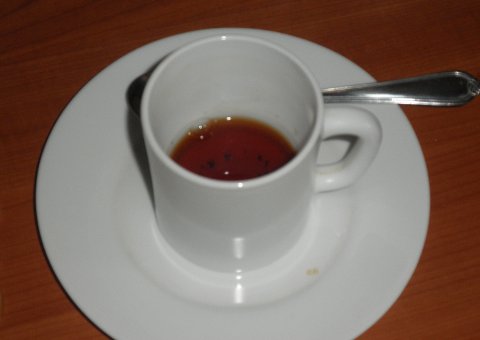
Then you take hot water out of a tea kettle which has brought the water to a temperature so hot that even the animals around Chernobyl would be intimidated:
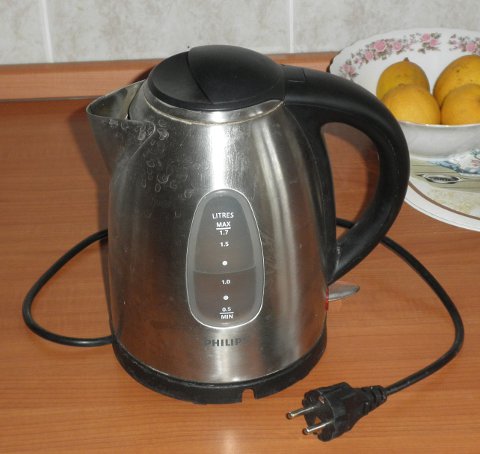
You then fill the the cup with the Chernobyl water:
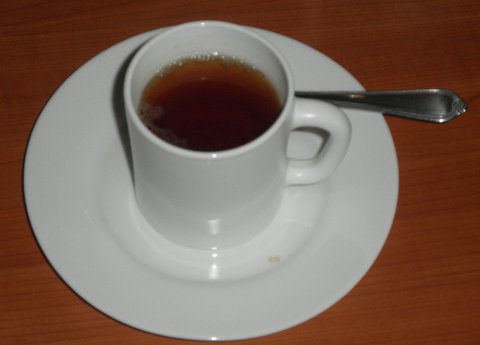
You then let it cool down a bit, say for 1.5 days (полтора дня). Then you drink the tea. And that's the proper way to make tea.
Okay, I was kidding about the 1.5 days part. But they really do heat the water up über-hot, and you really do have to let it cool a while.![]()
Кипяток
The Russians have a special word for boiled water which is кипяток. It is derived from the verb кипятить “to boil,” so etymologically кипяток means “boiled stuff.” Nowadays we Americans are convinced of the healthful benefits of water. We drink it from from the tap, from special spigots on refrigerators, from dopey coin-machines that charge us extra money for water delivered through the same distribution system as the water that flows into our kitchens and bathrooms, and from environmentally-assinine plastic bottles with designer names. Americans are so water-focused that we are stunned to learn that many Russians believe that drinking tap-water is unhealthy.
That's right: unhealthy. Truth to tell, city-wide distribution of clean water is a recent phenomenon in the history of man, and one that is not even consistent in the United States. Water quality in Russia still varies widely. As recently as 1997 one study reported a 95% incidence of giardiasis (nasty diarrheal disease) among travelers to St. Petersburg.¹ So when a Russian tells you that it's not a good idea to drink tap water, they are not passing on some quaint superstition, but rather a serious concern. For that reason, seasoned travelers to Russia often drink and brush their teeth in кипяток. Well... that's not quite right. Кипяток is water that is still boiling hot. Once it has cooled off, it is no longer кипяток. So experienced travelers drink and brush their teeth with water that was once кипяток. The noun has a fleeting vowel, so it declines like this:
| Sg | |
| Nom | кипяток |
| Acc | |
| Gen | кипятка |
| Pre | кипятке |
| Dat | кипятку |
| Ins | кипятком |
Sample sentences:
| Я попросил горничную, чтобы она приносила мне каждый день кувшин кипятка. | I asked the maid to bring me a pitcher of boiling water every day. |
| Он случайно ошпарил руку кипятком. | He accidentally scalded his hand with boiling water. |
| На дне Тихого океана обнаружены сверхгорячие источники с температурой воды от 250 до 400 градусов Цельсия, и в этом кипятке живут бактерии, гигантские черви, различные моллюски и даже некоторые виды крабов. (adapted from this source) | On the bottom of the Pacific Ocean superhot springs have been discovered with water temperatures from 240 to 400°C. The boiling water is inhabited by bacteria, giant worms, various mollusks, and even some types of crabs. |
| Нарезанные фрукты сложить в миску, облить их десятью стаканами кипятка. (adapted from this source) | Place the sliced fruit in a bowl and cover it with 10 cups of boiling water. |
¹ Ortega YR, Adam RD. Giardia: overview and update. Clin Infect Dis. 1997 Sep;25(3):545-9.
Чай (часть первая)
The Russian word for tea is чай. It declines like this:
| Sg | Pl | |
| Nom | чай | чаи |
| Acc | ||
| Gen | чая | чаёв |
| Pre | чае | чаях |
| Dat | чаю | чаям |
| Ins | чаем | чаями |
Чай first of all means the leaves of the tea plant and the drink made from those leaves. Sample sentences:
| Ты будешь чай? | Would you like some tea? |
| Мама пила чай с молоком и сахаром. | Mom used to drink tea with milk and sugar. |
| Маша никогда не пьёт чай с лимоном, так как у неё аллергия на лимоны. | Masha never drank tea with lemon since she was allergic to lemons. |
| Мой брат предпочитает чай без сахара. | My brother prefers tea without sugar. |
Just as in English, infusions and tisanes of other leaves are also called чай even when they contain no tea leaves:
| Пей мятный чай перед сном, и у тебя будут хорошие сны. | Drink mint tea before bed and you have sweet dreams. |
| Ромашковый чай помогает лучше спать. | Chamomile tea helps you sleep well. |
The plural of the word can mean “varieties of tea,” although it's an uncommon use of the word:
| В китайском квартале Сан-Франциско продаютя всякие чаи. | All sorts of tea are sold in San Francisco's Chinatown. |
Every once in a while you will encounter an old-fashioned u-stem genitive form of this word. Even though it looks like a dative, it's a genitive in meaning, which adds the idea of “some” to the sentence:
| Ты хочешь чаю? | Do you want some tea? |
You may also encounter an old-fashioned u-stem locative form of the word as well. Again, although it looks like a dative, the meaning is locational:
| Тьфу! В моём чаю муха. Я чуть не проглотил её. | Ugh! There's a fly in my tea. I almost swallowed it. |
Газировка
The Russian word газировка is a slang term for газированная вода (carbonated water) and can be translated as soda. At one point it was almost synonymous with various soft carbonated drinks like Тархун, Буратино, Дюшес, Байкал, and so on... Now people tend to go by the brand’s name, especially when it comes to the popular Coke and Pepsi products.
In the Soviet days and even the early nineties, one could often spot special self-service soda fountains on city streets and public areas like airports, train stations, parks, farmer markets, and etc. The bulky, rectangular apparatuses were similar to the vending machines of today; you’d insert a kopeck or two and select the desired drink (sweet drinks cost more). There were no bottles or cans, every machine had a reusable стакан (glass) that was to be rinsed off with water in a special compartment and then used for the газировка. On a hot afternoon there could be a line of people standing next to the soda machine, each patiently waiting to quench his tormenting thirst. If lucky, you could hear one of these glasses shatter on the pavement and then find out that it was the last one, or better yet you could absorb some of your predecessor’s germs. For some reason I still miss those machines, although since then have been turned into scrap metal and become part of Soviet-era nostalgia. How awesome would it be to just have one in your kitchen right now?
This is an image of a typical Soviet-era self-service soda machine. It's one kopeck for plain carbonated water and three kopecks for the water to be mixed with sweet syrup.
Here are some example sentences with газировка:
| Эта женщина меня случайно толкнула, и я пролил всю свою газировку на господина Мечниковa. | That woman accidentally pushed me and I spilled all of my soda on mister Mechnikov. |
| Летом Mиша любит пить холодную газировку и есть мороженое. | In the summertime, Misha likes to drink cold soda and eat ice-cream. |
| Hекоторые врачи говорят, что любая газировка очень вредна для здоровья. | Some doctors say that any kind of soda is very bad for the health. |
| Aмериканцы пьют намного больше газировки, чем русские и немцы. | Americans drink a lot more soda than Russians and Germans. |
